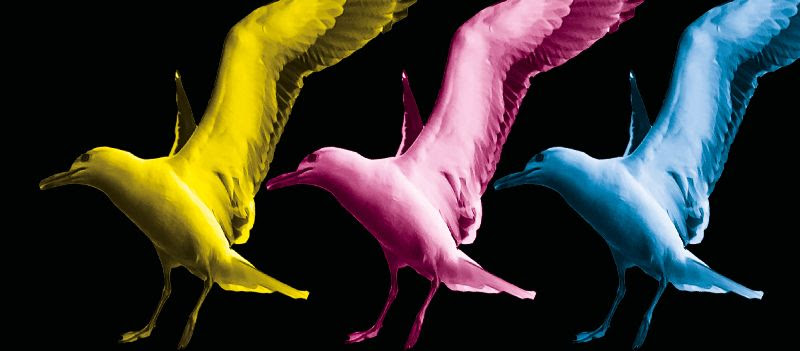
Directed by Sally Cookson and devised together by the company, The Three Seagulls is an imaginative, energetic production that has moments both of high drama and of brooding melancholy, but the dominant mood is one of celebration. Here are fourteen talented graduates from the BOVTS who are excited to be on the threshold of their careers in acting, and they are clearly delighted to be performing before a live audience – at last!
The show is based freely upon adaptations of Chekhov’s The Seagull by Christopher Hampton, Anya Reiss and Aaron Posner. Hampton’s adaptation is refreshingly unstuffy, and both Reiss and Posner have created irreverent, modernised versions – Posner’s is titled Stupid Fucking Bird. The BOVTS have added a number of ingredients of their own, and the result is a highly entertaining school leavers’ party.
This is a show where the fourth wall frequently disappears, and the audience is addressed directly, as when Welshman Dewi Wykes steps out of his role as Konstantin, the would-be playwright, and complains bitterly about the frequent mispronunciation of his real-life forename. It’s a very funny moment, and one of many where we are teased into thinking about the difference between reality and pretence, between life and art. One character in whom that distinction has disappeared is Konstantin’s formidable mother, Irina, an aging actress whose entire life has become a performance. She is portrayed magnificently by Tessa Wong, who endows her both with a diva-like grandeur and just enough self-awareness to know that her constant need for attention and praise is reprehensible, but unstoppable. For Irina, the show must go on, and on.
The Three Seagulls has three actors playing Konstantin, two playing Irina’s lover, Tregorin, and three playing Nina, the young, naive actress in love with Konstantin. There are also three actors playing Masha, the depressive drinker dressed in mourning black who is also in love with Konstantin. In the original play Masha gloomily accepts all of life’s bitter disappointments, but in this version all three Mashas finally unite in a show of brave self-assertion. All this doubling-up and tripling-up of roles may be a little confusing, but it is entirely in tune with the idea that this is a play partly about playing and pretence, and about how and why we suspend disbelief when we enter a theatre.
Another theme, and an entirely apt one for these young ambitious actors, is the desire for fame. When we first meet Nina she is in awe of Trigorin’s celebrity status as a successful novelist. But he is full of self-doubt, and tries to explain to her that he does not see himself the way his adoring readers do. But Nina clings to her romantic vision of the fame that a stage career will bring, and leaves to pursue an acting career. Some years later she returns, battered and bruised by the harsh realities of life, yet still bravely determined to be an actor. Though she has suffered a great deal, Nina refuses to see herself as a victim, and Eliza Smith very movingly delivers her tearful, repeated assertion that she is ‘not the seagull’; she is not like the poor bird that Konstantin once randomly shot dead. Her shallow romanticism has been replaced by a grim resolve to persevere. Like her, these student actors are surely all too aware that a hard road lies ahead, and that whatever starry-eyed dreams of fame and glory they may have, they also know that that a great deal of determination and perseverance will be required if they are to succeed.
The Three Seagulls begins with a darkly comic song that tells us that life is a disappointment that ends in death, but it ends with a rousing dance number that is full of optimism. We also hear the actors’ plans for what they will do once the show comes to the end of its run. ‘Have a bacon sandwich’ and ‘Have a long lie-in’ are perhaps the most prosaic of these, but again remind us that the life of an actor is not all glamour. The Three Seagulls is an impudent but affectionate celebration of Chekhov, and a highly inventive celebration of theatre itself. Catch it if you can. ★★★★☆ Mike Whitton 6th July 2021

